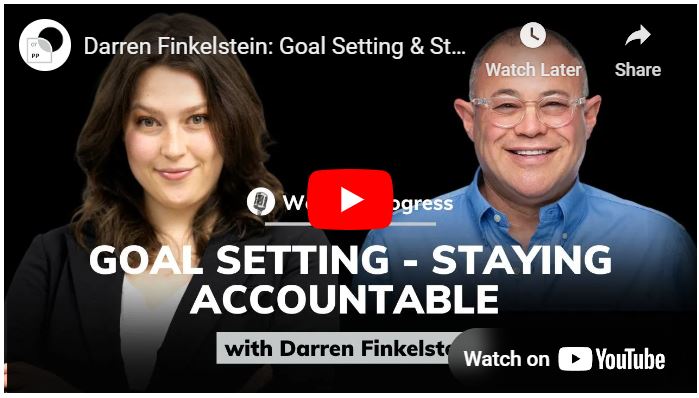Starting a new business mentoring program can be an exciting yet challenging journey. Mentoring is about sharing experiences and guiding new businesses to success. A successful mentoring program helps mentees and enriches the mentors’ experiences through shared wisdom and learning. With the right strategies, these programs can be a source of great value, ensuring that both businesses and individuals benefit significantly.

Discover your Accountability Score and increase the probability of smashing your GOALS and Getting Sh!t Done!
Imagine you’re setting up a new mentoring program. You must ensure it’s not just well-intentioned but also well-executed. This involves putting effective strategies in place from the beginning. Take, for example, a small tech start-up in Victoria. They decided to launch a mentoring initiative to help new entrepreneurs navigate the tricky landscape of digital innovation. By focusing on clear goals and strong pairings between mentors and mentees, they set the stage for a thriving environment aimed at shared growth and success. It’s all about building the right foundation to make sure everyone involved gets the most out of the experience.
Setting Clear Goals For Your Mentoring Program
Defining clear objectives is critical when setting up a mentoring program. Goals give direction and focus, making sure everyone is on the same page and working towards common achievements. So, how do you set these goals? Start by understanding the specific needs of your business and what you hope to accomplish through mentoring.
Here’s a simple way to set your goals:
- Identify your primary objectives: Consider what you want to achieve. Is it to enhance the skills of new employees, foster innovation, or provide career advancement opportunities?
- Align goals with business needs: Make sure your mentoring program aligns with your company’s overall strategies and objectives. This connection helps ensure the program’s success.
- Set realistic and measurable targets: Create goals that can be tracked and assessed. Look for specific targets that ensure accountability and encourage progress.
Aligning these goals with the business’s overall objectives means looking at the bigger picture. For instance, if improving leadership skills is part of your company’s long-term strategy, ensure the mentoring program focuses on nurturing these qualities. This way, the goals benefit individuals and contribute to the company’s success in meeting its broader ambitions.
Selecting the Right Mentors and Mentees
Selecting the appropriate individuals for a mentoring program is akin to selecting the ideal components for a puzzle. The connections have to fit well to ensure a productive exchange. Here are some key points to keep in mind:
1. Criteria for Effective Mentors: Look for mentors who are not only skilled in their field but also patient, open-minded, and effective communicators. They should be willing to share insights and experiences without holding back.
2. Matching Mentors with Mentees: Consider the skills and needs of both parties. A successful match often involves pairing mentors and mentees with similar industry backgrounds or challenges. This common ground makes it easier to establish trust and encourage honest dialogue.
3. Building Strong Relationships: Encourage open communication and set regular meeting schedules. These regular check-ins maintain engagement and ensure the mentoring relationships stay focused on reaching their goals.
By picking the right people and fostering strong connections, mentoring becomes not just a transfer of knowledge but an empowering experience for both mentors and mentees. When mentors and mentees share similar pathways or goals, the program becomes more enriching, with each participant gaining valuable insights and perspectives.
Designing a Structured Mentoring Process
Creating a well-structured mentoring process is like building a sturdy bridge that connects mentors and mentees. This structure provides a clear path for both to follow, ensuring that interactions are meaningful and productive. One of the best ways to kick off a mentoring program is to set up a consistent schedule for meetings. Regular catch-ups help maintain momentum, allowing participants to stay on track with their goals and address any challenges promptly.
An effective mentoring framework often includes these components:
- Scheduled Meetings: Set up regular meetings to check in and discuss progress. A weekly or biweekly schedule works well to maintain consistency.
- Goal Tracking: Implement a system to track the goals you set at the beginning. The system could be as simple as a shared online document where both parties can update progress.
- Feedback Sessions: Encourage feedback sessions. These allow mentors and mentees to discuss what works well and what can be improved, keeping the relationship dynamic and effective.
Flexibility is also key to a successful mentoring process. While it’s important to have a structure, leaving room for adjustments makes it easier to respond to changing needs. Building a mentoring process this way ensures that the program is equipped to offer the right support and adapt as necessary.
Offering Continuous Support and Resources
For a mentoring program to thrive, ongoing support and resources are essential. Think of it as providing the right tools for the job. Mentors and mentees need access to materials and guidance that can help in their journey. Offering a library of resources like training materials, workshops, and expert consultations can make a huge difference in their growth.
Feedback is a powerful tool for both mentors and mentees. Encouraging regular feedback helps assess what’s working and what could be better, fostering an environment where everyone is invested in improvement. When both parts of the mentoring equation are committed to growth, the entire program benefits.
Measuring the Success of Your Mentoring Program
Knowing how well your mentoring program is performing is just as important as setting it up. Evaluating its effectiveness helps ensure it meets the intended goals. Consider using key performance indicators (KPIs) to measure success. These indicators could include the achievement of set goals, improved skills of mentees, and the satisfaction of both mentors and mentees with the program.
Collecting feedback at different stages aids in painting a clear picture of the program’s impact. By reviewing progress and outcomes, you can make the necessary improvements to keep the mentoring program thriving. This ongoing assessment should be part of your strategy, ensuring a continually beneficial mentoring relationship.
Crafting a Lasting Mentorship Culture
Establishing a mentoring culture within an organisation offers long-term benefits. It extends beyond the formal program, embedding mentorship into how your company operates daily. To integrate this culture, consider aligning mentorship practices with the company’s values and demonstrating the benefits to all staff.
Creating spaces, both physical and virtual, where mentoring conversations can happen naturally encourages a more organic mentorship culture. Such an environment can boost morale, enhance collaboration, and promote continuous learning across the organisation.
As these habits solidify, the positive effects on business growth become apparent. An organisation that values mentorship fosters a more engaging and accountable workforce. Such an environment makes mentoring not just an initiative, but a core part of how the company supports and develops its talent.
Tick Those Boxes specialises in helping individuals and organisations become more accountable. Contact our team to see how our programs may help you establish a more effective and accountable workplace, allowing you to do the things you say you will do and getting your teams to do the same.
Enhance your strategy today by exploring how a well-designed business mentoring program can raise your organisation’s potential. With the right guidance and resources, you can foster a culture of growth and accountability that leads to sustainable success. Tick Those Boxes specialises in helping individuals and organisations become more accountable. Contact our team to see how our programs may help you establish a more effective and accountable workplace, allowing you to do the things you say you will do and getting your teams to do the same.


